Agency Problem in Corporate Finance
VerifiedAdded on 2023/05/28
|9
|2215
|371
AI Summary
The agency problem in corporate finance refers to the conflict of interest between managers and stakeholders. This article discusses the causes, effects, and solutions to the agency problem, including the role of incentives, ownership structure, and managerial compensation.
Contribute Materials
Your contribution can guide someone’s learning journey. Share your
documents today.
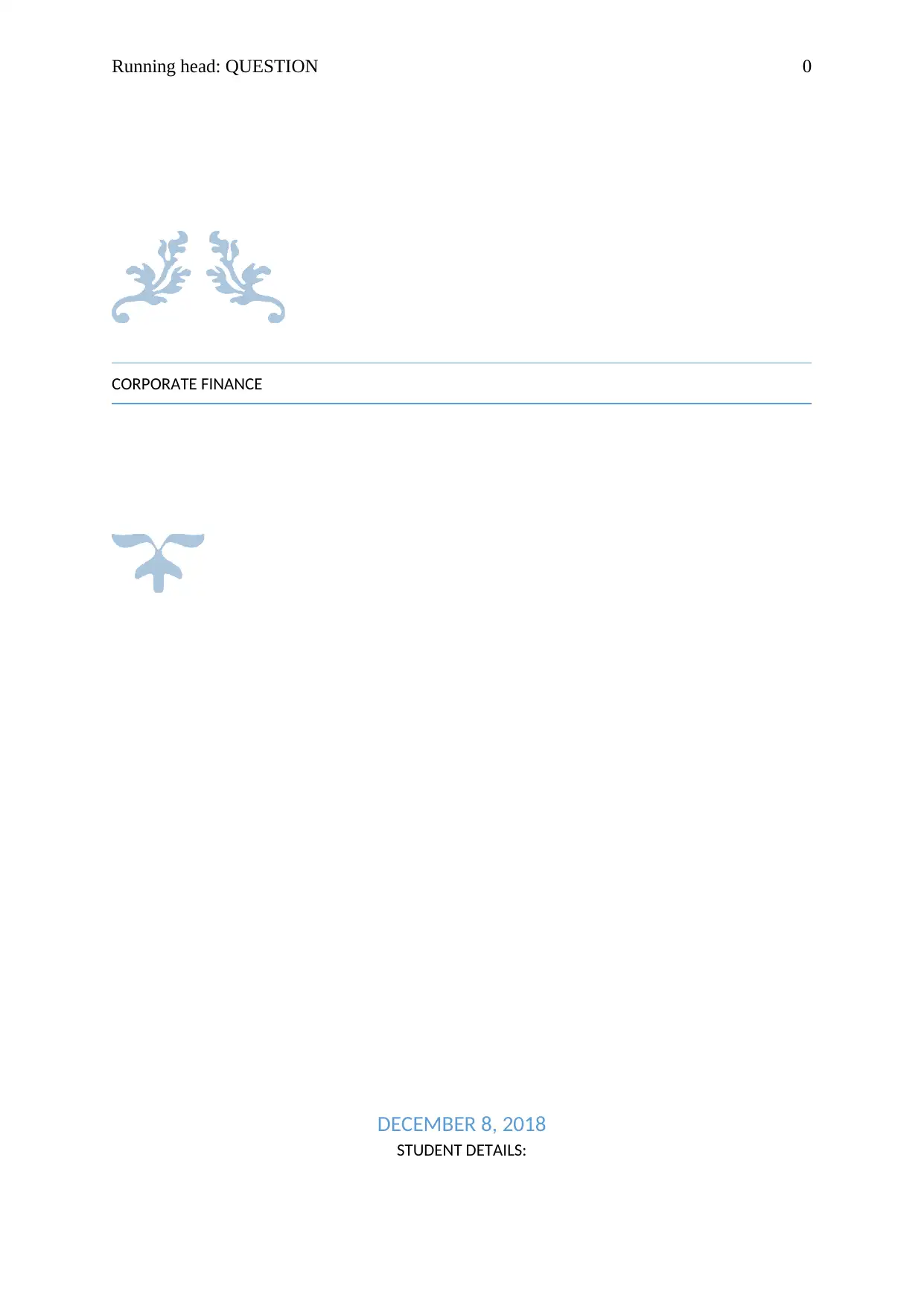
Running head: QUESTION 0
CORPORATE FINANCE
DECEMBER 8, 2018
STUDENT DETAILS:
CORPORATE FINANCE
DECEMBER 8, 2018
STUDENT DETAILS:
Secure Best Marks with AI Grader
Need help grading? Try our AI Grader for instant feedback on your assignments.
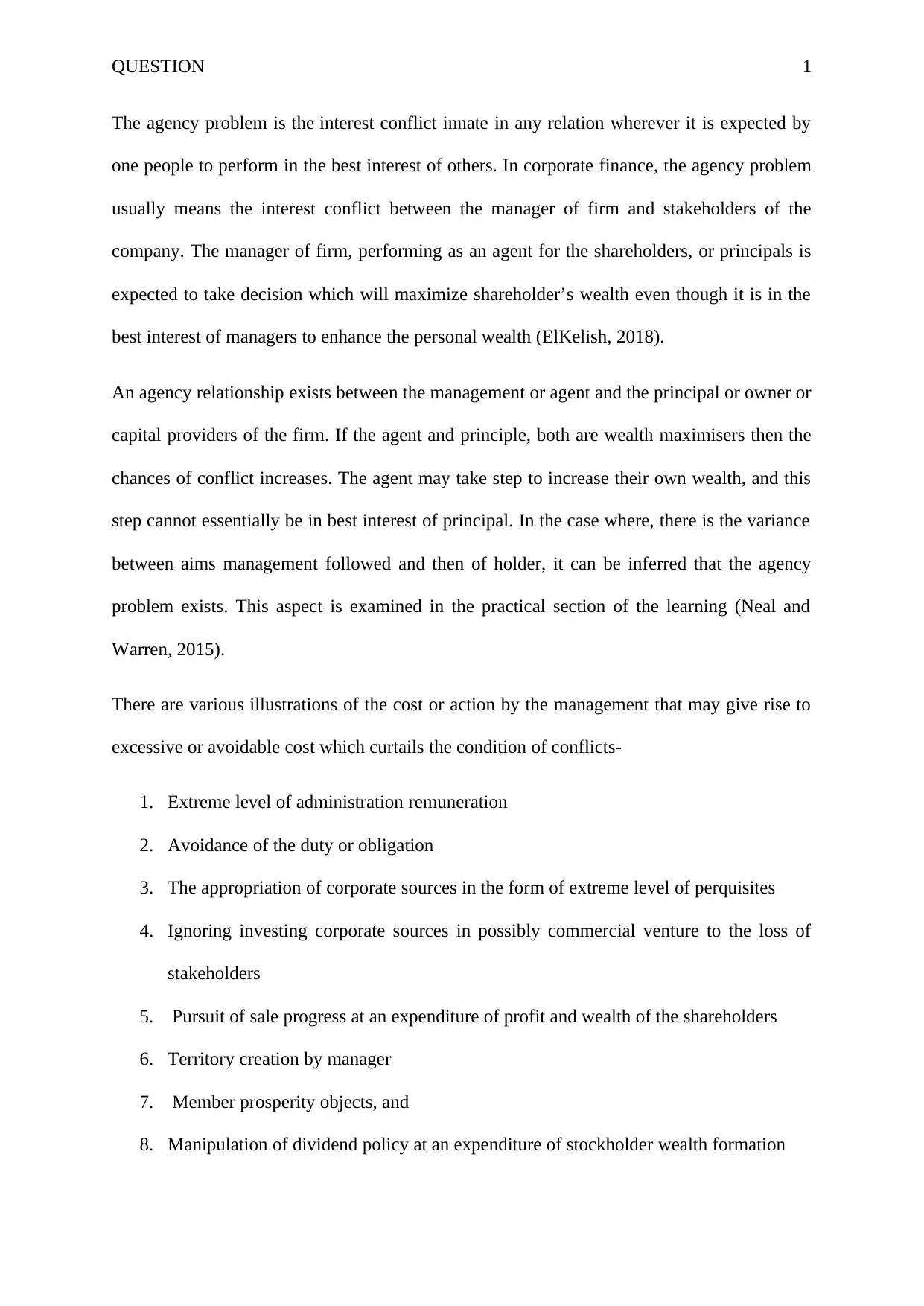
QUESTION 1
The agency problem is the interest conflict innate in any relation wherever it is expected by
one people to perform in the best interest of others. In corporate finance, the agency problem
usually means the interest conflict between the manager of firm and stakeholders of the
company. The manager of firm, performing as an agent for the shareholders, or principals is
expected to take decision which will maximize shareholder’s wealth even though it is in the
best interest of managers to enhance the personal wealth (ElKelish, 2018).
An agency relationship exists between the management or agent and the principal or owner or
capital providers of the firm. If the agent and principle, both are wealth maximisers then the
chances of conflict increases. The agent may take step to increase their own wealth, and this
step cannot essentially be in best interest of principal. In the case where, there is the variance
between aims management followed and then of holder, it can be inferred that the agency
problem exists. This aspect is examined in the practical section of the learning (Neal and
Warren, 2015).
There are various illustrations of the cost or action by the management that may give rise to
excessive or avoidable cost which curtails the condition of conflicts-
1. Extreme level of administration remuneration
2. Avoidance of the duty or obligation
3. The appropriation of corporate sources in the form of extreme level of perquisites
4. Ignoring investing corporate sources in possibly commercial venture to the loss of
stakeholders
5. Pursuit of sale progress at an expenditure of profit and wealth of the shareholders
6. Territory creation by manager
7. Member prosperity objects, and
8. Manipulation of dividend policy at an expenditure of stockholder wealth formation
The agency problem is the interest conflict innate in any relation wherever it is expected by
one people to perform in the best interest of others. In corporate finance, the agency problem
usually means the interest conflict between the manager of firm and stakeholders of the
company. The manager of firm, performing as an agent for the shareholders, or principals is
expected to take decision which will maximize shareholder’s wealth even though it is in the
best interest of managers to enhance the personal wealth (ElKelish, 2018).
An agency relationship exists between the management or agent and the principal or owner or
capital providers of the firm. If the agent and principle, both are wealth maximisers then the
chances of conflict increases. The agent may take step to increase their own wealth, and this
step cannot essentially be in best interest of principal. In the case where, there is the variance
between aims management followed and then of holder, it can be inferred that the agency
problem exists. This aspect is examined in the practical section of the learning (Neal and
Warren, 2015).
There are various illustrations of the cost or action by the management that may give rise to
excessive or avoidable cost which curtails the condition of conflicts-
1. Extreme level of administration remuneration
2. Avoidance of the duty or obligation
3. The appropriation of corporate sources in the form of extreme level of perquisites
4. Ignoring investing corporate sources in possibly commercial venture to the loss of
stakeholders
5. Pursuit of sale progress at an expenditure of profit and wealth of the shareholders
6. Territory creation by manager
7. Member prosperity objects, and
8. Manipulation of dividend policy at an expenditure of stockholder wealth formation
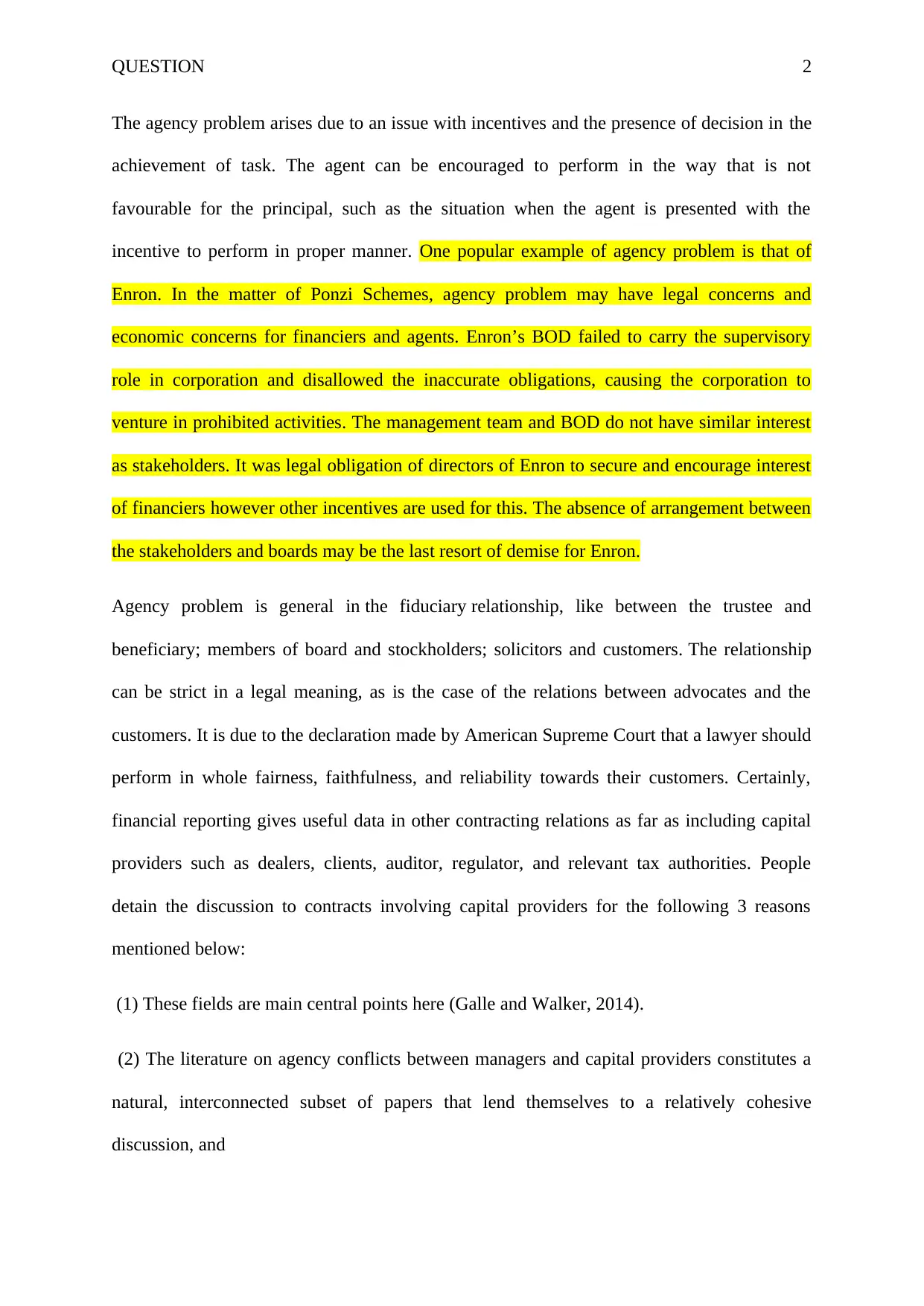
QUESTION 2
The agency problem arises due to an issue with incentives and the presence of decision in the
achievement of task. The agent can be encouraged to perform in the way that is not
favourable for the principal, such as the situation when the agent is presented with the
incentive to perform in proper manner. One popular example of agency problem is that of
Enron. In the matter of Ponzi Schemes, agency problem may have legal concerns and
economic concerns for financiers and agents. Enron’s BOD failed to carry the supervisory
role in corporation and disallowed the inaccurate obligations, causing the corporation to
venture in prohibited activities. The management team and BOD do not have similar interest
as stakeholders. It was legal obligation of directors of Enron to secure and encourage interest
of financiers however other incentives are used for this. The absence of arrangement between
the stakeholders and boards may be the last resort of demise for Enron.
Agency problem is general in the fiduciary relationship, like between the trustee and
beneficiary; members of board and stockholders; solicitors and customers. The relationship
can be strict in a legal meaning, as is the case of the relations between advocates and the
customers. It is due to the declaration made by American Supreme Court that a lawyer should
perform in whole fairness, faithfulness, and reliability towards their customers. Certainly,
financial reporting gives useful data in other contracting relations as far as including capital
providers such as dealers, clients, auditor, regulator, and relevant tax authorities. People
detain the discussion to contracts involving capital providers for the following 3 reasons
mentioned below:
(1) These fields are main central points here (Galle and Walker, 2014).
(2) The literature on agency conflicts between managers and capital providers constitutes a
natural, interconnected subset of papers that lend themselves to a relatively cohesive
discussion, and
The agency problem arises due to an issue with incentives and the presence of decision in the
achievement of task. The agent can be encouraged to perform in the way that is not
favourable for the principal, such as the situation when the agent is presented with the
incentive to perform in proper manner. One popular example of agency problem is that of
Enron. In the matter of Ponzi Schemes, agency problem may have legal concerns and
economic concerns for financiers and agents. Enron’s BOD failed to carry the supervisory
role in corporation and disallowed the inaccurate obligations, causing the corporation to
venture in prohibited activities. The management team and BOD do not have similar interest
as stakeholders. It was legal obligation of directors of Enron to secure and encourage interest
of financiers however other incentives are used for this. The absence of arrangement between
the stakeholders and boards may be the last resort of demise for Enron.
Agency problem is general in the fiduciary relationship, like between the trustee and
beneficiary; members of board and stockholders; solicitors and customers. The relationship
can be strict in a legal meaning, as is the case of the relations between advocates and the
customers. It is due to the declaration made by American Supreme Court that a lawyer should
perform in whole fairness, faithfulness, and reliability towards their customers. Certainly,
financial reporting gives useful data in other contracting relations as far as including capital
providers such as dealers, clients, auditor, regulator, and relevant tax authorities. People
detain the discussion to contracts involving capital providers for the following 3 reasons
mentioned below:
(1) These fields are main central points here (Galle and Walker, 2014).
(2) The literature on agency conflicts between managers and capital providers constitutes a
natural, interconnected subset of papers that lend themselves to a relatively cohesive
discussion, and
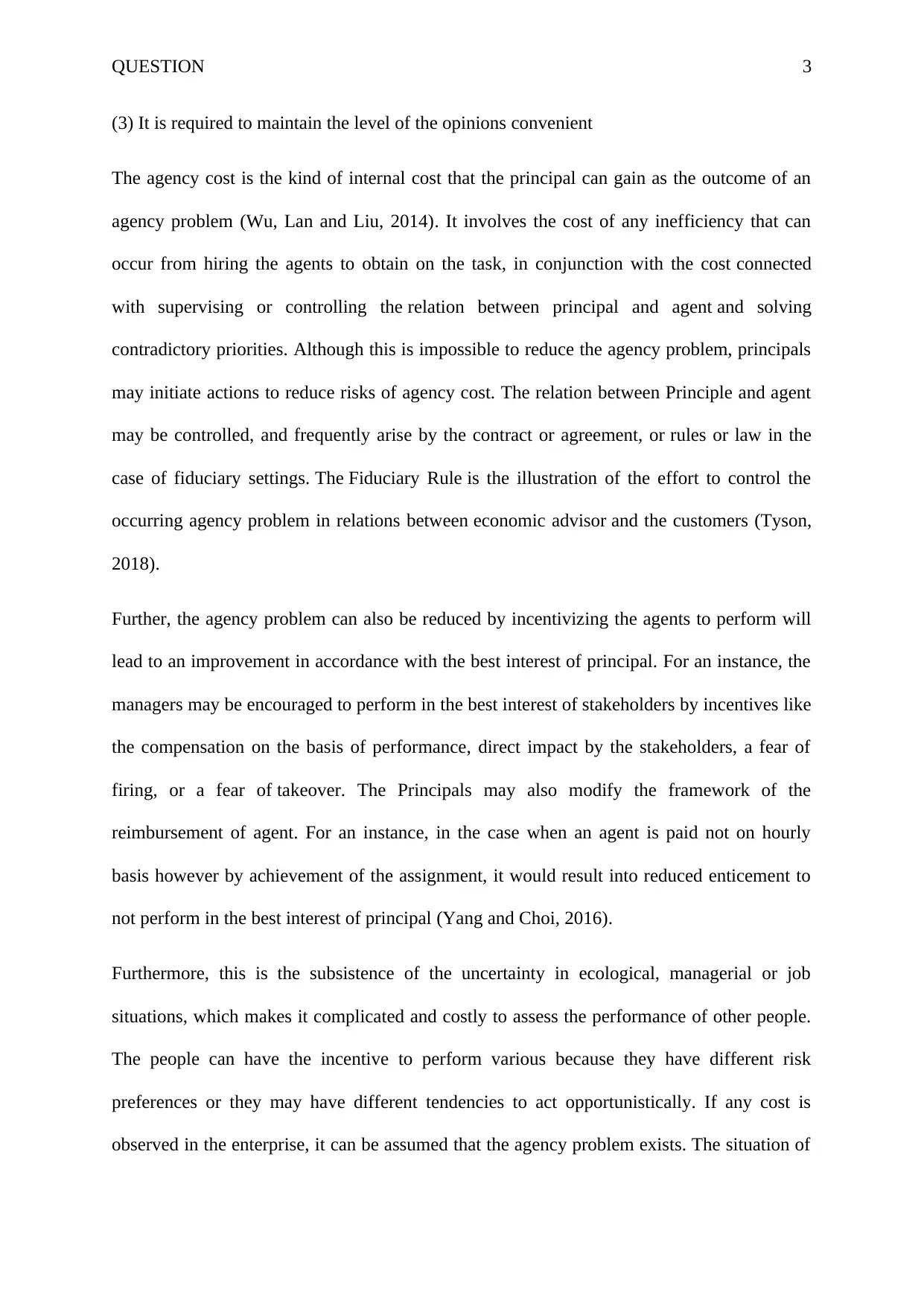
QUESTION 3
(3) It is required to maintain the level of the opinions convenient
The agency cost is the kind of internal cost that the principal can gain as the outcome of an
agency problem (Wu, Lan and Liu, 2014). It involves the cost of any inefficiency that can
occur from hiring the agents to obtain on the task, in conjunction with the cost connected
with supervising or controlling the relation between principal and agent and solving
contradictory priorities. Although this is impossible to reduce the agency problem, principals
may initiate actions to reduce risks of agency cost. The relation between Principle and agent
may be controlled, and frequently arise by the contract or agreement, or rules or law in the
case of fiduciary settings. The Fiduciary Rule is the illustration of the effort to control the
occurring agency problem in relations between economic advisor and the customers (Tyson,
2018).
Further, the agency problem can also be reduced by incentivizing the agents to perform will
lead to an improvement in accordance with the best interest of principal. For an instance, the
managers may be encouraged to perform in the best interest of stakeholders by incentives like
the compensation on the basis of performance, direct impact by the stakeholders, a fear of
firing, or a fear of takeover. The Principals may also modify the framework of the
reimbursement of agent. For an instance, in the case when an agent is paid not on hourly
basis however by achievement of the assignment, it would result into reduced enticement to
not perform in the best interest of principal (Yang and Choi, 2016).
Furthermore, this is the subsistence of the uncertainty in ecological, managerial or job
situations, which makes it complicated and costly to assess the performance of other people.
The people can have the incentive to perform various because they have different risk
preferences or they may have different tendencies to act opportunistically. If any cost is
observed in the enterprise, it can be assumed that the agency problem exists. The situation of
(3) It is required to maintain the level of the opinions convenient
The agency cost is the kind of internal cost that the principal can gain as the outcome of an
agency problem (Wu, Lan and Liu, 2014). It involves the cost of any inefficiency that can
occur from hiring the agents to obtain on the task, in conjunction with the cost connected
with supervising or controlling the relation between principal and agent and solving
contradictory priorities. Although this is impossible to reduce the agency problem, principals
may initiate actions to reduce risks of agency cost. The relation between Principle and agent
may be controlled, and frequently arise by the contract or agreement, or rules or law in the
case of fiduciary settings. The Fiduciary Rule is the illustration of the effort to control the
occurring agency problem in relations between economic advisor and the customers (Tyson,
2018).
Further, the agency problem can also be reduced by incentivizing the agents to perform will
lead to an improvement in accordance with the best interest of principal. For an instance, the
managers may be encouraged to perform in the best interest of stakeholders by incentives like
the compensation on the basis of performance, direct impact by the stakeholders, a fear of
firing, or a fear of takeover. The Principals may also modify the framework of the
reimbursement of agent. For an instance, in the case when an agent is paid not on hourly
basis however by achievement of the assignment, it would result into reduced enticement to
not perform in the best interest of principal (Yang and Choi, 2016).
Furthermore, this is the subsistence of the uncertainty in ecological, managerial or job
situations, which makes it complicated and costly to assess the performance of other people.
The people can have the incentive to perform various because they have different risk
preferences or they may have different tendencies to act opportunistically. If any cost is
observed in the enterprise, it can be assumed that the agency problem exists. The situation of
Secure Best Marks with AI Grader
Need help grading? Try our AI Grader for instant feedback on your assignments.
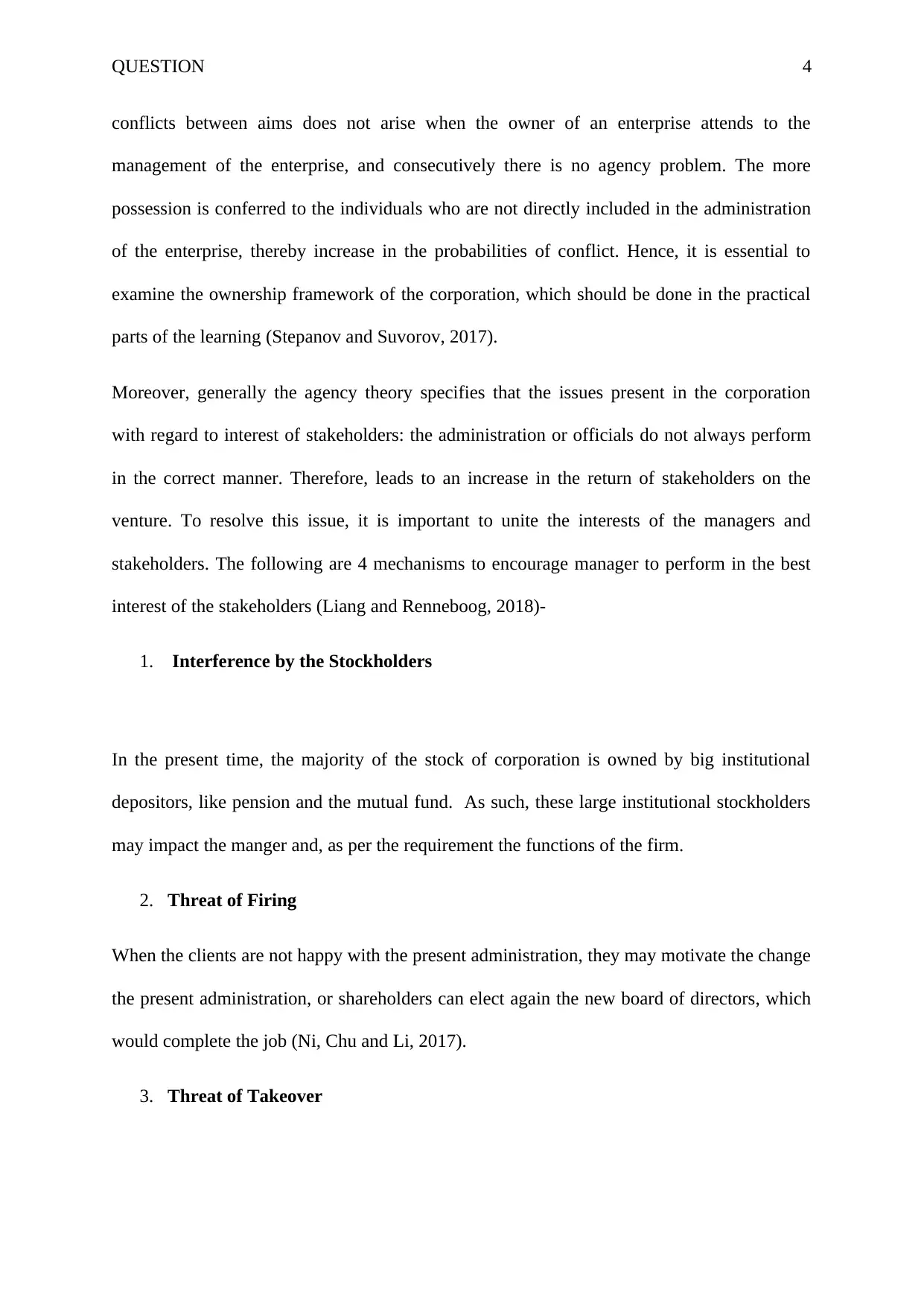
QUESTION 4
conflicts between aims does not arise when the owner of an enterprise attends to the
management of the enterprise, and consecutively there is no agency problem. The more
possession is conferred to the individuals who are not directly included in the administration
of the enterprise, thereby increase in the probabilities of conflict. Hence, it is essential to
examine the ownership framework of the corporation, which should be done in the practical
parts of the learning (Stepanov and Suvorov, 2017).
Moreover, generally the agency theory specifies that the issues present in the corporation
with regard to interest of stakeholders: the administration or officials do not always perform
in the correct manner. Therefore, leads to an increase in the return of stakeholders on the
venture. To resolve this issue, it is important to unite the interests of the managers and
stakeholders. The following are 4 mechanisms to encourage manager to perform in the best
interest of the stakeholders (Liang and Renneboog, 2018)-
1. Interference by the Stockholders
In the present time, the majority of the stock of corporation is owned by big institutional
depositors, like pension and the mutual fund. As such, these large institutional stockholders
may impact the manger and, as per the requirement the functions of the firm.
2. Threat of Firing
When the clients are not happy with the present administration, they may motivate the change
the present administration, or shareholders can elect again the new board of directors, which
would complete the job (Ni, Chu and Li, 2017).
3. Threat of Takeover
conflicts between aims does not arise when the owner of an enterprise attends to the
management of the enterprise, and consecutively there is no agency problem. The more
possession is conferred to the individuals who are not directly included in the administration
of the enterprise, thereby increase in the probabilities of conflict. Hence, it is essential to
examine the ownership framework of the corporation, which should be done in the practical
parts of the learning (Stepanov and Suvorov, 2017).
Moreover, generally the agency theory specifies that the issues present in the corporation
with regard to interest of stakeholders: the administration or officials do not always perform
in the correct manner. Therefore, leads to an increase in the return of stakeholders on the
venture. To resolve this issue, it is important to unite the interests of the managers and
stakeholders. The following are 4 mechanisms to encourage manager to perform in the best
interest of the stakeholders (Liang and Renneboog, 2018)-
1. Interference by the Stockholders
In the present time, the majority of the stock of corporation is owned by big institutional
depositors, like pension and the mutual fund. As such, these large institutional stockholders
may impact the manger and, as per the requirement the functions of the firm.
2. Threat of Firing
When the clients are not happy with the present administration, they may motivate the change
the present administration, or shareholders can elect again the new board of directors, which
would complete the job (Ni, Chu and Li, 2017).
3. Threat of Takeover
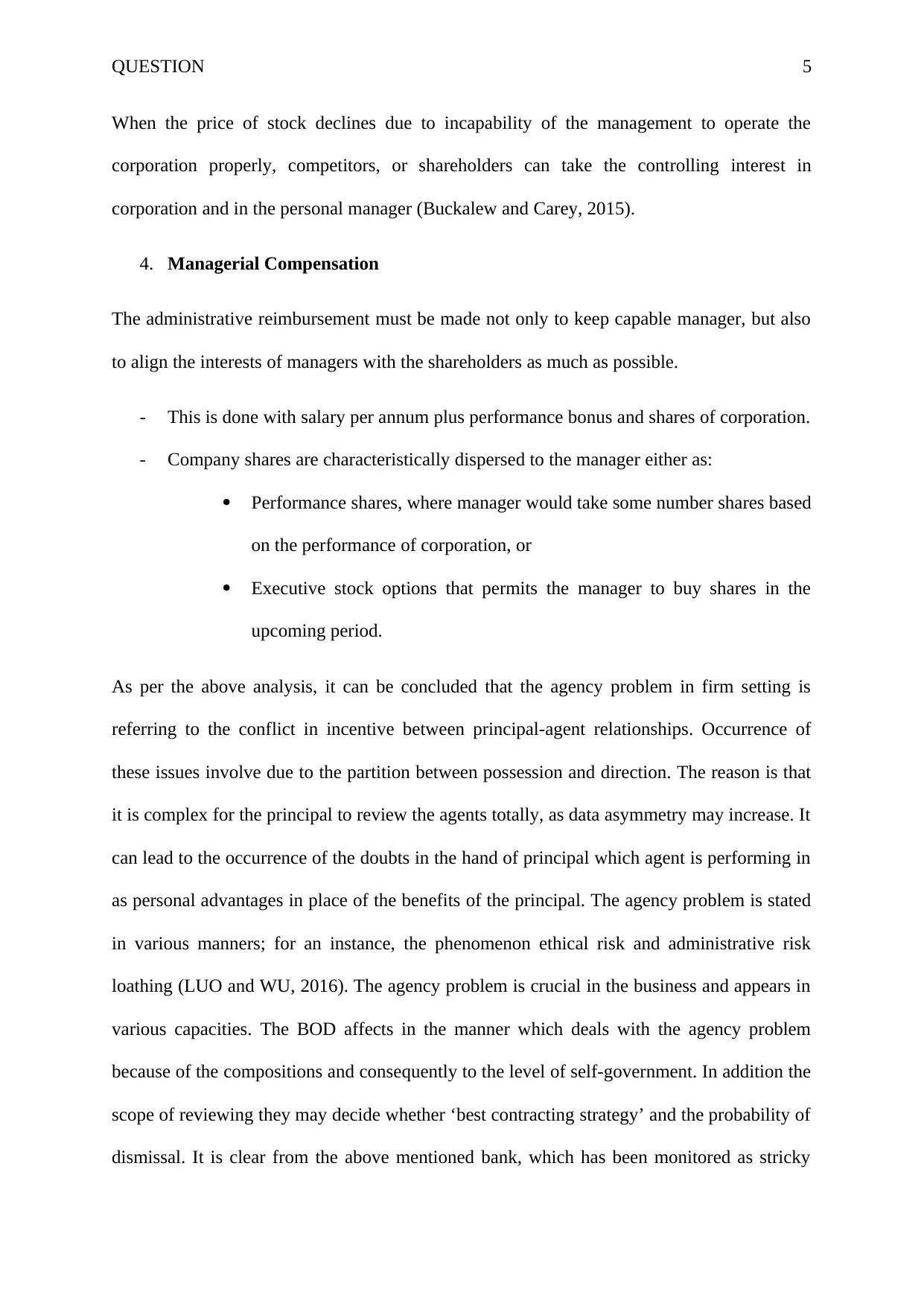
QUESTION 5
When the price of stock declines due to incapability of the management to operate the
corporation properly, competitors, or shareholders can take the controlling interest in
corporation and in the personal manager (Buckalew and Carey, 2015).
4. Managerial Compensation
The administrative reimbursement must be made not only to keep capable manager, but also
to align the interests of managers with the shareholders as much as possible.
- This is done with salary per annum plus performance bonus and shares of corporation.
- Company shares are characteristically dispersed to the manager either as:
Performance shares, where manager would take some number shares based
on the performance of corporation, or
Executive stock options that permits the manager to buy shares in the
upcoming period.
As per the above analysis, it can be concluded that the agency problem in firm setting is
referring to the conflict in incentive between principal-agent relationships. Occurrence of
these issues involve due to the partition between possession and direction. The reason is that
it is complex for the principal to review the agents totally, as data asymmetry may increase. It
can lead to the occurrence of the doubts in the hand of principal which agent is performing in
as personal advantages in place of the benefits of the principal. The agency problem is stated
in various manners; for an instance, the phenomenon ethical risk and administrative risk
loathing (LUO and WU, 2016). The agency problem is crucial in the business and appears in
various capacities. The BOD affects in the manner which deals with the agency problem
because of the compositions and consequently to the level of self-government. In addition the
scope of reviewing they may decide whether ‘best contracting strategy’ and the probability of
dismissal. It is clear from the above mentioned bank, which has been monitored as stricky
When the price of stock declines due to incapability of the management to operate the
corporation properly, competitors, or shareholders can take the controlling interest in
corporation and in the personal manager (Buckalew and Carey, 2015).
4. Managerial Compensation
The administrative reimbursement must be made not only to keep capable manager, but also
to align the interests of managers with the shareholders as much as possible.
- This is done with salary per annum plus performance bonus and shares of corporation.
- Company shares are characteristically dispersed to the manager either as:
Performance shares, where manager would take some number shares based
on the performance of corporation, or
Executive stock options that permits the manager to buy shares in the
upcoming period.
As per the above analysis, it can be concluded that the agency problem in firm setting is
referring to the conflict in incentive between principal-agent relationships. Occurrence of
these issues involve due to the partition between possession and direction. The reason is that
it is complex for the principal to review the agents totally, as data asymmetry may increase. It
can lead to the occurrence of the doubts in the hand of principal which agent is performing in
as personal advantages in place of the benefits of the principal. The agency problem is stated
in various manners; for an instance, the phenomenon ethical risk and administrative risk
loathing (LUO and WU, 2016). The agency problem is crucial in the business and appears in
various capacities. The BOD affects in the manner which deals with the agency problem
because of the compositions and consequently to the level of self-government. In addition the
scope of reviewing they may decide whether ‘best contracting strategy’ and the probability of
dismissal. It is clear from the above mentioned bank, which has been monitored as stricky
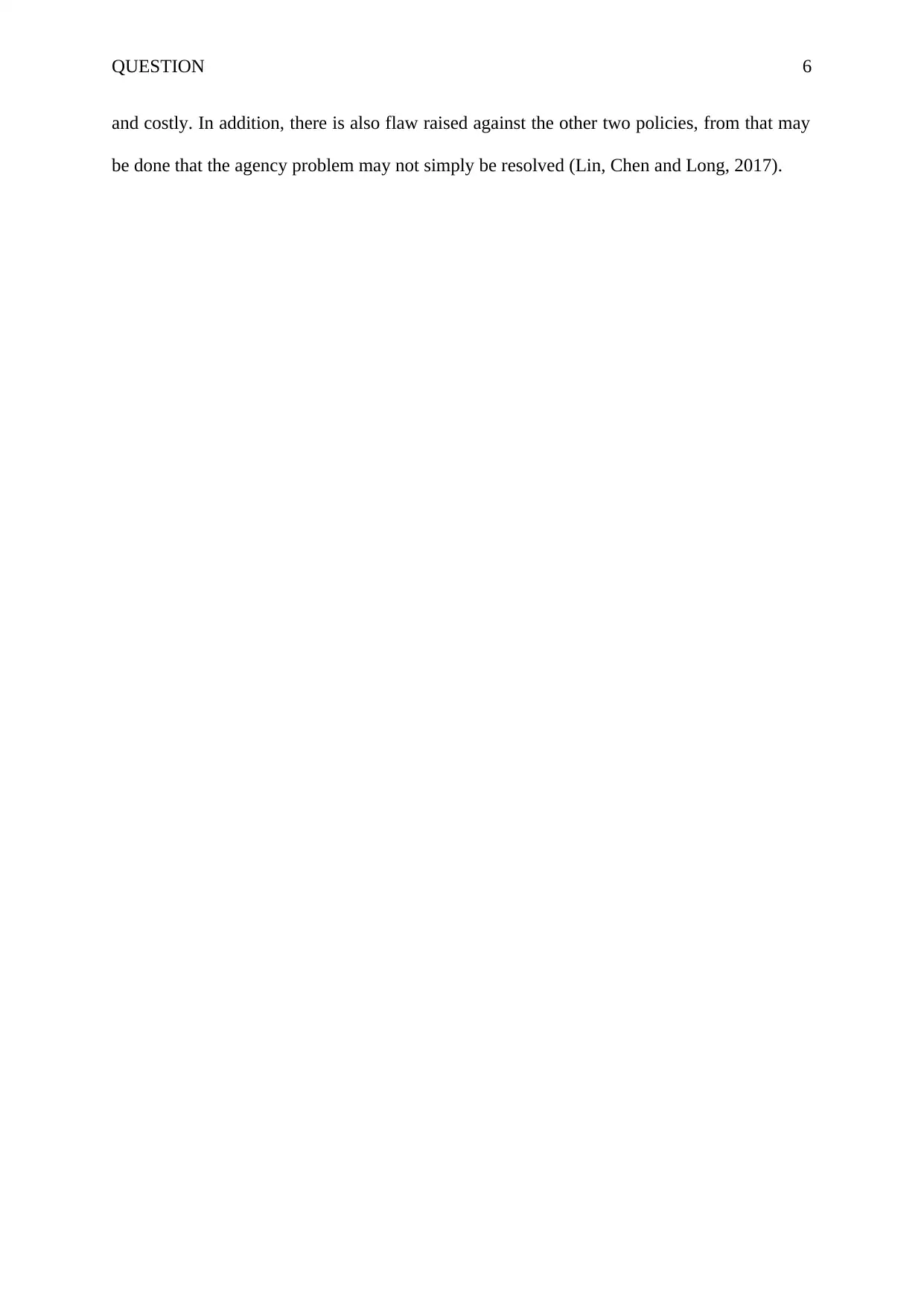
QUESTION 6
and costly. In addition, there is also flaw raised against the other two policies, from that may
be done that the agency problem may not simply be resolved (Lin, Chen and Long, 2017).
and costly. In addition, there is also flaw raised against the other two policies, from that may
be done that the agency problem may not simply be resolved (Lin, Chen and Long, 2017).
Paraphrase This Document
Need a fresh take? Get an instant paraphrase of this document with our AI Paraphraser
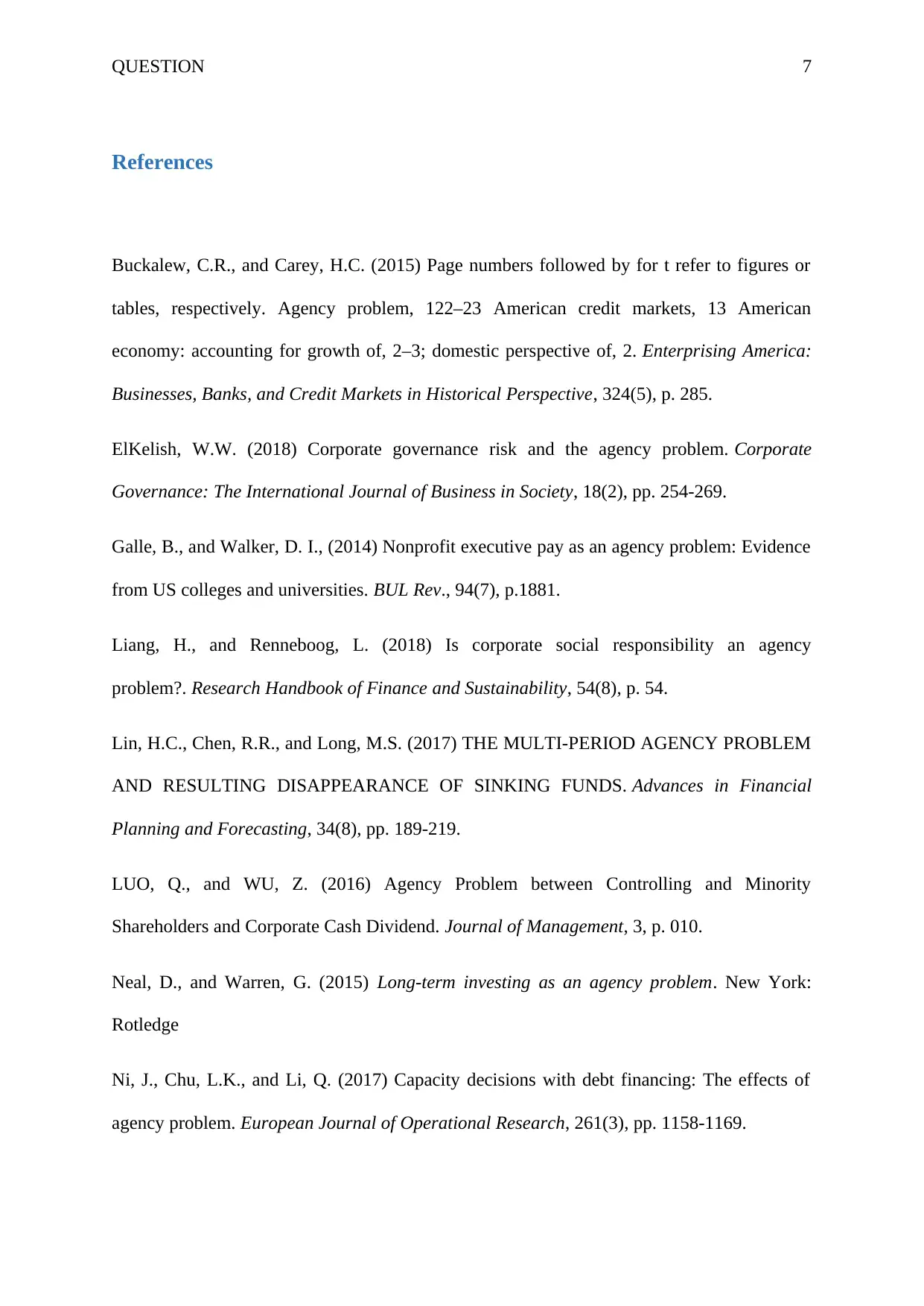
QUESTION 7
References
Buckalew, C.R., and Carey, H.C. (2015) Page numbers followed by for t refer to figures or
tables, respectively. Agency problem, 122–23 American credit markets, 13 American
economy: accounting for growth of, 2–3; domestic perspective of, 2. Enterprising America:
Businesses, Banks, and Credit Markets in Historical Perspective, 324(5), p. 285.
ElKelish, W.W. (2018) Corporate governance risk and the agency problem. Corporate
Governance: The International Journal of Business in Society, 18(2), pp. 254-269.
Galle, B., and Walker, D. I., (2014) Nonprofit executive pay as an agency problem: Evidence
from US colleges and universities. BUL Rev., 94(7), p.1881.
Liang, H., and Renneboog, L. (2018) Is corporate social responsibility an agency
problem?. Research Handbook of Finance and Sustainability, 54(8), p. 54.
Lin, H.C., Chen, R.R., and Long, M.S. (2017) THE MULTI-PERIOD AGENCY PROBLEM
AND RESULTING DISAPPEARANCE OF SINKING FUNDS. Advances in Financial
Planning and Forecasting, 34(8), pp. 189-219.
LUO, Q., and WU, Z. (2016) Agency Problem between Controlling and Minority
Shareholders and Corporate Cash Dividend. Journal of Management, 3, p. 010.
Neal, D., and Warren, G. (2015) Long-term investing as an agency problem. New York:
Rotledge
Ni, J., Chu, L.K., and Li, Q. (2017) Capacity decisions with debt financing: The effects of
agency problem. European Journal of Operational Research, 261(3), pp. 1158-1169.
References
Buckalew, C.R., and Carey, H.C. (2015) Page numbers followed by for t refer to figures or
tables, respectively. Agency problem, 122–23 American credit markets, 13 American
economy: accounting for growth of, 2–3; domestic perspective of, 2. Enterprising America:
Businesses, Banks, and Credit Markets in Historical Perspective, 324(5), p. 285.
ElKelish, W.W. (2018) Corporate governance risk and the agency problem. Corporate
Governance: The International Journal of Business in Society, 18(2), pp. 254-269.
Galle, B., and Walker, D. I., (2014) Nonprofit executive pay as an agency problem: Evidence
from US colleges and universities. BUL Rev., 94(7), p.1881.
Liang, H., and Renneboog, L. (2018) Is corporate social responsibility an agency
problem?. Research Handbook of Finance and Sustainability, 54(8), p. 54.
Lin, H.C., Chen, R.R., and Long, M.S. (2017) THE MULTI-PERIOD AGENCY PROBLEM
AND RESULTING DISAPPEARANCE OF SINKING FUNDS. Advances in Financial
Planning and Forecasting, 34(8), pp. 189-219.
LUO, Q., and WU, Z. (2016) Agency Problem between Controlling and Minority
Shareholders and Corporate Cash Dividend. Journal of Management, 3, p. 010.
Neal, D., and Warren, G. (2015) Long-term investing as an agency problem. New York:
Rotledge
Ni, J., Chu, L.K., and Li, Q. (2017) Capacity decisions with debt financing: The effects of
agency problem. European Journal of Operational Research, 261(3), pp. 1158-1169.
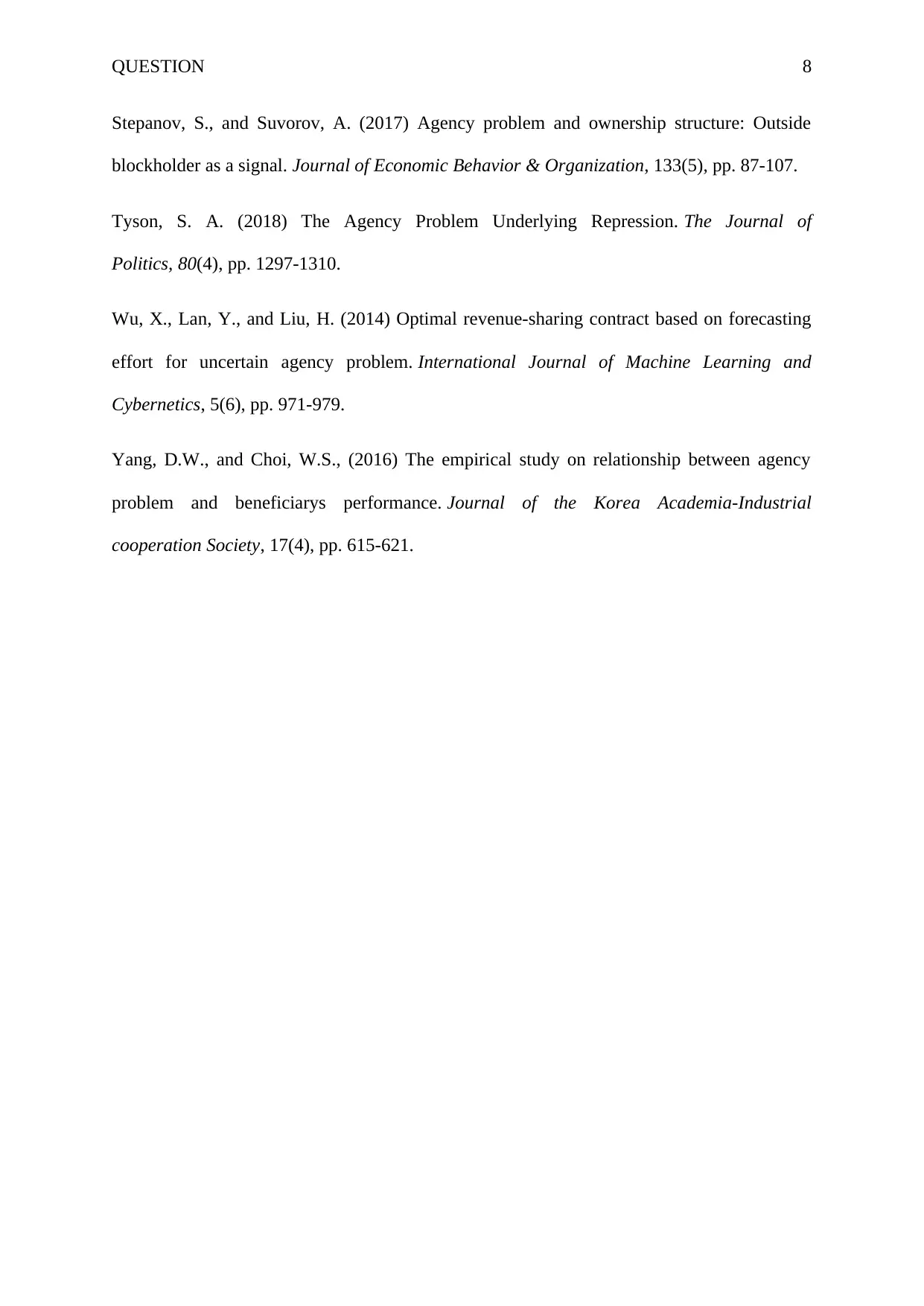
QUESTION 8
Stepanov, S., and Suvorov, A. (2017) Agency problem and ownership structure: Outside
blockholder as a signal. Journal of Economic Behavior & Organization, 133(5), pp. 87-107.
Tyson, S. A. (2018) The Agency Problem Underlying Repression. The Journal of
Politics, 80(4), pp. 1297-1310.
Wu, X., Lan, Y., and Liu, H. (2014) Optimal revenue-sharing contract based on forecasting
effort for uncertain agency problem. International Journal of Machine Learning and
Cybernetics, 5(6), pp. 971-979.
Yang, D.W., and Choi, W.S., (2016) The empirical study on relationship between agency
problem and beneficiarys performance. Journal of the Korea Academia-Industrial
cooperation Society, 17(4), pp. 615-621.
Stepanov, S., and Suvorov, A. (2017) Agency problem and ownership structure: Outside
blockholder as a signal. Journal of Economic Behavior & Organization, 133(5), pp. 87-107.
Tyson, S. A. (2018) The Agency Problem Underlying Repression. The Journal of
Politics, 80(4), pp. 1297-1310.
Wu, X., Lan, Y., and Liu, H. (2014) Optimal revenue-sharing contract based on forecasting
effort for uncertain agency problem. International Journal of Machine Learning and
Cybernetics, 5(6), pp. 971-979.
Yang, D.W., and Choi, W.S., (2016) The empirical study on relationship between agency
problem and beneficiarys performance. Journal of the Korea Academia-Industrial
cooperation Society, 17(4), pp. 615-621.
1 out of 9
Related Documents
Your All-in-One AI-Powered Toolkit for Academic Success.
+13062052269
info@desklib.com
Available 24*7 on WhatsApp / Email
![[object Object]](/_next/static/media/star-bottom.7253800d.svg)
Unlock your academic potential
© 2024 | Zucol Services PVT LTD | All rights reserved.





